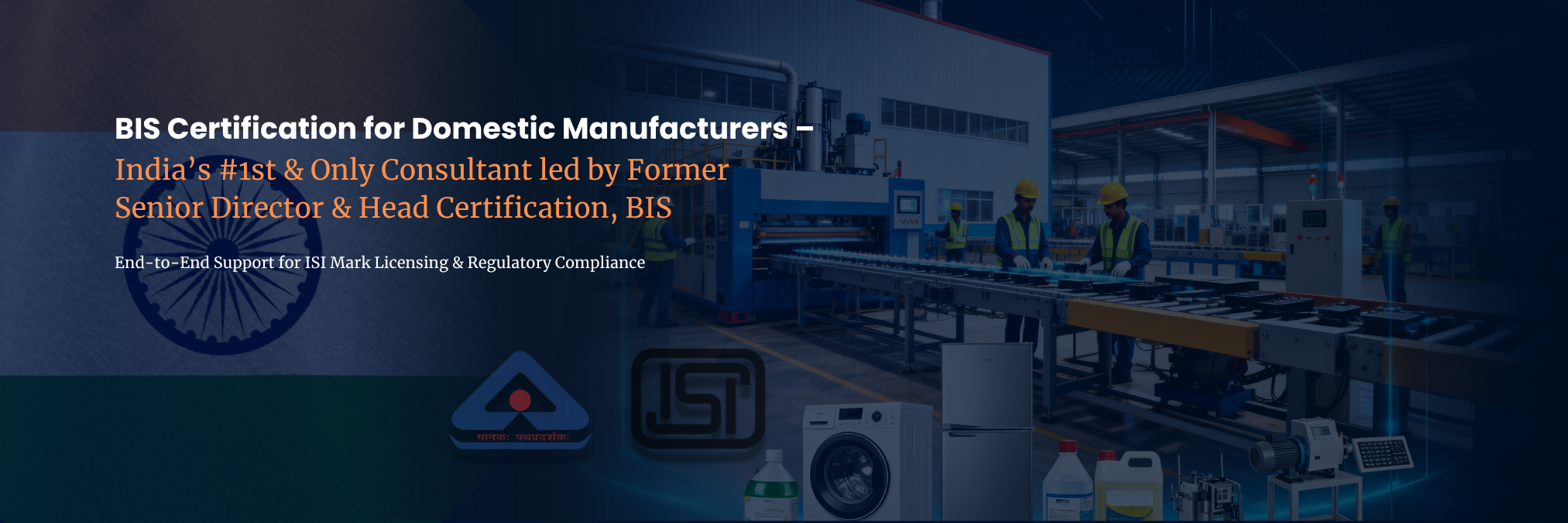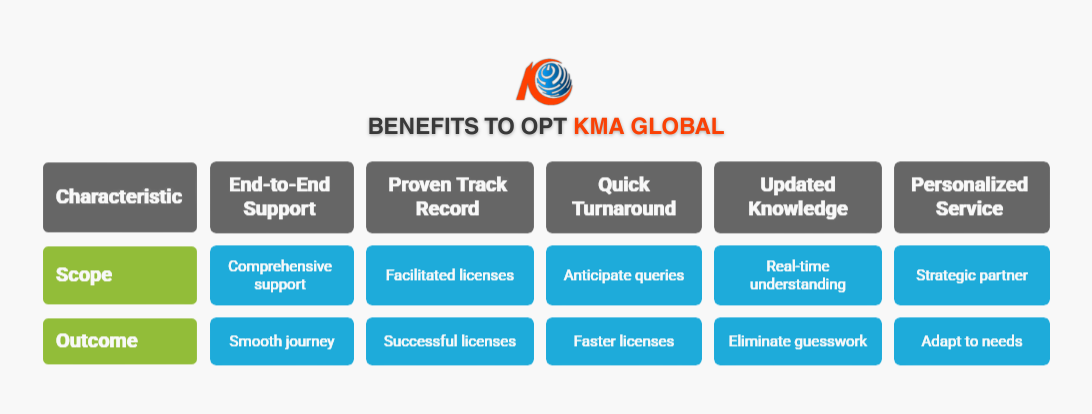

BIS Certification is a vital initiative by the Bureau of Indian Standards (BIS) that empowers domestic manufacturers to produce and sell high-quality, safe, and reliable products in the Indian market. Through this scheme, eligible Indian manufacturers can use the ISI Mark, a symbol of conformity to the relevant Indian Standard.
This certification process is governed under Scheme-I of Schedule-II of the BIS Act, 2016 and the Conformity Assessment Regulations, 2018. It ensures that products manufactured comply with the requirements, laid down in the Indian standards, covering safety, performance and quality requirements.
The Bureau of Indian Standards plays a vital role in assessing, inspecting and certifying product manufacturing units. By obtaining BIS certification, domestic manufacturers gain not only regulatory compliance but also a competitive edge in both government procurement & consumer markets.
The core objective of BIS in granting the ISI Mark licence to domestic manufacturers is to ensure that a good quality products, complying all applicable safety & regulatery requirements is received by Indain consumers.
The BIS certification for domestic manufacturers is governed through a well designed product certification scheme I of BIS. The said scheme ensures that products manufactured in India comply with the relevant Indian Standards. This scheme is exclusively for the manufacturers and not intended for traders & importers.
Under this scheme, manufacturers of all such products where Indian Standard is available, may obtain a BIS license to use the popular ISI Mark—a mark of quality, safety, and reliability. The certification process involves verification of manufacturing & testing facilities and capabilities through factory inspection, product testing in the factory and in independent testing to check the conformity of the product as per the relevant Indain Standard. In addition acceptance of Scheme of Testing & Inspection (SIT) and advance annual marking fee and payment of applicable fee as per the procedure, are also part of Certification process.
BIS Standard Mark/ISI Mark
The BIS Standard Mark, popularly known as ISI Mark, a symbol of quality, safety & reliability, issued by the Bureau of Indian Standards (BIS) which includes:
This mark is granted only after thorough evaluation and successful grant of the BIS certificate, which certifies that the manufacturing process and final product conform to the applicable Indian Standard.
The BIS certification helps Indian manufacturers to:

The BIS Certification for domestic manufacturers is governed under Scheme-I of BIS (Conformity Assessment) Regulations, 2018, offers multiple advantages to Indian manufacturers producing goods covered under an Indian Standards. The Key benefits include:
Seamless Market Access
Legal Use of ISI Mark
Competitive Market Advantage
Eligibility for Government Procurement
To obtain a BIS licence under Scheme-I of BIS (Conformity Assessment) Regulations, 2018, domestic manufacturers must meet the following eligibility requirements:
1. Applicant Must Be a Manufacturer
2. Compliance with Relevant Indian Standard (IS)
3. In-house Manufacturing and Testing Facility
4. Scheme of Inspection & Testing (SIT) and Marking Fee
5. Separate Application for Each IS Standard and Location
Domestic manufacturers must follow the procedure below to obtain a BIS licence to use the ISI Mark:
1. Determine Applicability
- Responsibility- Applicant
2. Prepare for Application
Ensure your manufacturing unit has:
- Responsibility- Applicant
3. Submit Application
Apply through the Manakonline portal (www.manakonline.in) by submitting:
- Responsibility- Applicant
4. Scrutiny of Application
- Responsibility- BIS
5. Factory Inspection by BIS Officer
A BIS officer visits the manufacturing premises to:
- Responsibility- BIS
6. Product Testing
- Responsibility- BIS recognised laboratory
7. Review of Inspection & Test Reports
- Responsibility- BIS
8. Grant of Licence
- Responsibility- BIS
9. Surveillance Inspections
- Responsibility- BIS
The timeline to grant a licence to domestic manufacturer under Scheme-I typically ranges from 30 to 60 days, subject to the following conditions:
Note: Any discrepancies in documentation, testing delays, or non-conformities during inspection can extend the processing time.
| Sr No. | A. For Applicants / B. For Licensees |
Type of Fees/Charges | Amount |
|---|---|---|---|
| 1. | A-1 | Application Fee (Non-refundable) | INR 1,000.00 |
| 2. | A-2 | Inspection Fee (per man-day) | INR 7,000.00 |
| 3. | A-3 | Testing Charges | As applicable (based on product/category) |
| 4. | A-4 | Annual Licence Fee | INR 1,000 |
| 5. | A-5 | Advance Minimum Marking Fee | As applicable (based on product/category) |
| 6. |
B-1 |
Renewal Application Fee (Non-refundable) |
INR 1,000 |
| 7. |
B-2 |
Late Fee for Renewal | INR 5,000 |
| 8. |
B-3 |
Marking Fee |
As applicable (determined based on factors such as production volume and cost of surveillance) |
| 9. |
B-4 |
Special Visit Charges (per man-day) |
INR 7,000 |
| 10. |
B-5 |
Processing Fee for New Varieties |
INR 5,000 per variety / group (as per BIS guidelines) |
| 11. |
B-6 |
Design & Drawing Approval (e.g., LPG cylinders, valves, regulators) |
INR 5,000 per approval |
| 12. |
B-7 |
Testing Charges |
As applicable |
| 13. |
B-8 |
Duplicate Licence Issuance |
INR 1,000 |
| 14. |
B-9 |
Counter Sample Testing Charges |
Twice the normal testing fee |
| 15. |
B-10 |
Witnessing of Testing (Counter Sample) |
INR 10,000 plus travel, boarding, lodging of BIS staff |
| 16. |
B-11 |
Testing for Resumption / Applicant / Verification Samples |
As applicable |
Important Notes:
Taxes: All fees are subject to applicable Goods and Services Tax (GST) as per Indian tax regulations
| Sr.No | Products Name | IS Standard |
|---|---|---|
|
1 |
CEMENT (SULPHATE RESISTING PORTLAND CEMENT) | IS 12330 |
|
2 |
CEMENT (LOW HEAT PORTLAND CEMENT) | IS 12600 |
|
3 |
CEMENT (PORTLAND POZZOLANA CEMENT-PART1 FLY-ASH BASED) | IS 1489 (Part-1) |
|
4 |
CEMENT (PORTLAND POZZOLANA CEMENT-PART 2 CALCINED CLAY BASED) | IS 1489 (Part-2) |
|
5 |
CEMENT (ORDINARY PORTLAND CEMENT) | IS 269 |
|
6 |
CEMENT (MASONRY CEMENT) | IS 3466 |
|
7 |
CEMENT (PORTLAND SLAG CEMENT) | IS 455 |
KMA Global is driven by unmatched expertise in BIS certification. Our leadership includes:
With a combined experience of over 60 years in certification activities, including the Domestic Manufacturer Scheme under BIS (Scheme-I), they provide strategic guidance and technical oversight that sets us apart.
1. End-to-End Support
We provide comprehensive support throughout the BIS certification process for Indian manufacturers—from application to grant of licence. Our team handles:
As your trusted consultant, we ensure a smooth and structured journey for domestic manufacturers complying with Indian Standards.
2. Proven Track Record
KMA Global has successfully facilitated BIS licences for numerous Indian manufacturers, across sectors such as electrical appliances, steel, cement, automotive components, and packaging.
Both our leaders, during their tenure in BIS, supervised certification schemes and conducted inspections at manufacturing premises across India.
3. Quick Turnaround & BIS Query Resolution
Our in-depth understanding of the BIS Act, Rules, Regulations, and working methodology enables us to:
Domestic manufacturers benefit from our ability to simplify procedural requirements and expedite approval timelines.
4. Updated Knowledge of Bureau of Indian Standards Act, Rules & Regulations
Our leadership’s involvement in BIS policy, implementation, and certification activities ensures real-time awareness of evolving Indian Standards, amendments, and procedural updates.
We ensure that your documentation, systems, and factory processes align with the latest BIS requirements.
5. Personalized Service for Every Client
We treat each client as a strategic partner, offering:
Whether you’re applying for your first BIS licence or extending your certification to additional product standards, we adapt to your specific manufacturing needs with precision.
Looking for ISI Mark Certification For Foreign Manufacturer?
Explore our FMCS Certification page for detailed guidance.
Looking for BIS Scheme X Certification?
Visit our BIS Scheme X Certification page for a complete guide and expert assistance.

The BIS Product Certification Scheme grants the ISI Mark to Indian manufacturers whose products meet Indian Standards (IS). It ensures product quality, safety, and compliance with BIS regulations.
No, ISI Mark certification is voluntary for most products. However, it is mandatory for certain items that impact public health and safety, such as electrical appliances, cement, and packaged drinking water.
Any domestic manufacturer producing goods that conform to Indian Standards can apply for ISI certification, provided they have a manufacturing facility in India.
The application process involves:
The key documents include:
The certification process typically takes 30 to 90 days, depending on factors like document verification, inspection scheduling, and product testing.
BIS officials visit the manufacturing facility to:
Product samples are tested in BIS-approved laboratories to ensure compliance with Indian Standards.
If a product does not meet the required standards, the manufacturer must rectify the defects and submit a fresh application for re-evaluation.
Once certified, manufacturers must:
BIS regularly monitors certified manufacturers through surprise inspections and random market sampling to ensure compliance.
If BIS finds non-compliance, it may:
The initial ISI certification is valid for one year and can be renewed annually if the manufacturer continues to meet BIS standards.
To renew the ISI Mark certification, manufacturers must:
The cost varies based on the product type and includes:
Yes, unauthorized use of the ISI Mark is a punishable offense under the BIS Act, and strict legal action may be taken against violators.
The updated list of products under mandatory ISI certification is available on the BIS website:https://www.bis.gov.in
Consumers and businesses can verify an ISI-certified product through the BIS Certification Database available on the BIS website